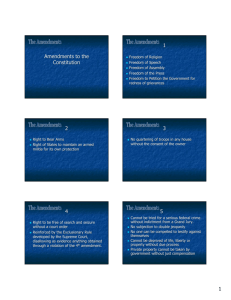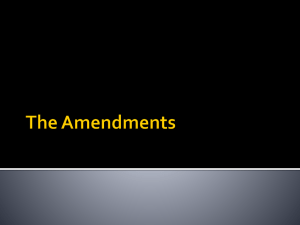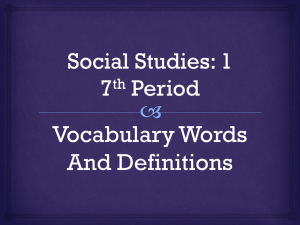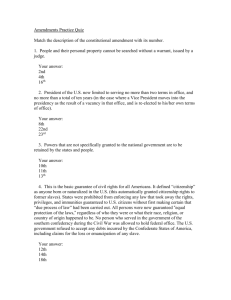The Bill of Rights & the 17 Amendments to the US
advertisement
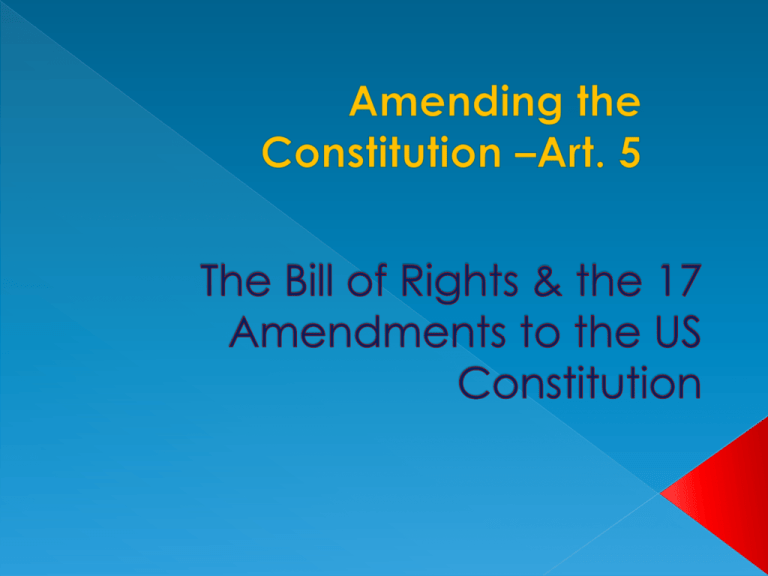
Allowed by Article 5 of the Constitution Amendments may be proposed by: › Congress (2/3 in both houses) National Convention (requested by 2/3 of state legislatures) Amendments may be ratified: › ¾ of all state legislatures special state convention in ¾ of all states Introduced by James Madison in 1789 by the request of Anti-federalists Came into effect in 1791 after ratified by ¾ of the states Also known as the first 10 Amendments to the Constitution Freedom of Religion (No gov’t establishment of & free exercise) Freedom of Speech Freedom of Assembly (to meet) Freedom of the Press Freedom to Petition the Government for redress of grievances Right to bear arms Right of States to maintain an armed militia for its own protection No quartering of troops in any house without the consent of the owner Right to be free of search and seizure You may only be search or arrested if the police have a warrant Reinforced by the Exclusionary Rule developed by the Supreme Court, disallowing as evidence anything obtained through a violation of the 4th amendment Cannot be tried for a serious federal crime without indictment from a Grand Jury No double jeopardy Right to remain silent (no self-incrimination) Cannot be deprived of life, liberty or property without due process Private property cannot be taken by government without just compensation (eminent domain) Right of the accused to a speedy and public trial before an impartial jury Accused must be informed of charges and have the right to cross-examine hostile witnesses Right to require testimony of favorable witnesses (subpoena) Right to be represented by an attorney at every stage of the criminal process Right to a trial by jury in civil cases in Federal court if the amount of money exceeds $20. Right to a jury trial can be waived by both parties (bench trial—tried before a judge) Prohibits: › Excessive bail › Excessive fines › Cruel & unusual punishment Unenumerated rights The fact that many civil rights are expressly set forth in the Constitution does not mean that there are not others retained by the people. Powers reserved for the people All powers the Constitution does not grant to the federal gov’t & not expressly forbidden to the States belong to the the States and people of each State States cannot be sued by another State or foreign country or by citizens of other States or by its own residents. Repealed part of Article III section II of the Constitution Election of the President and Vice President Changes part of Article II section 1 Each elector in the Electoral College casts two ballots now: one for President and one for Vice President. (Before, the person with the 2nd highest number of votes was elected Vice President) Forbids slavery or involuntary servitude in the United States -except as punishmentfor a crime. Defines citizenship › Any person who is born or naturalized in the U.S. › You are a citizen in the state where you live. No State shall deprive a U.S. Citizen of life, liberty or property, without due process of law. No State shall deny to any person equal protection of the laws. › Removes the 3/5 clause from Article I Section II No one can be denied the right to vote because of race, color or “previous condition of servitude.” Creates federal Income Tax › Before this amendment, only the states could tax an individual’s income Senators elected by popular vote instead of by State legislatures If vacancy occurs, governor must call a special election. › The governor may appoint a replacement for the remainder of the term if the state legislature authorizes that step. Prohibition of the production, possession, sale, distribution and importation of intoxicating liquors Later repealed by the 21st amendment Only amendment to be repealed Women’s vote – Right to vote cannot be denied on the basis of sex. Changes date for start President’s/VP’s term to Jan 20th Moved start of Congress’ term to January 3rd Lame Duck Amendment Repeal of the 18th Amendment (End of Prohibition) Two term limit for President If President succeeded to the Presidency in the last half of the previous presidency, maximum term limit 10 years. Added Presidential Electors for the District of Columbia –Washington D.C. Maximum the same number of Electors for the least populous State (3) No one may be denied the right to vote in any federal election for not paying any poll tax or other tax. Provision for presidential succession Provided for the replacement of the V.P. when there is a vacancy. (President nominates, subject to majority vote of both Houses of Congress President can make written declaration to Senate pro tem and Speaker of the House that he is incapacitated, temporarily relieved by Vice President until he delivers rescindment letter. Voting age reduced from 21 to 18 › A State may enact a lower age to vote. Limits Congress’ control over its wages by delaying implementation of any increase until after the next regular Congressional election.

